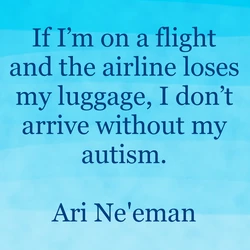
Identity-first language is the opposite of person-first language. Saying "Autistic person" rather than "person with Autism" is using identity-first language.
Identity-first language is not the norm in professional use, despite many Autistic people asking to be referred to this way. Its use or lack thereof is sometimes used when considering whether an organization bothers to listen to autistic people or not.
Advocacy organizations such as ASAN, the Autism Women's Network, and AASPIRE follow this preference.
Identity-first language has also been adopted by the Deaf and Blind communities.
History in Autism[]
Autistic people began championing identity-first language before the turn of the century, notably with Jim Sinclair's essay "Why I dislike 'person first' language."[1]
The blog Real Social Skills notes its important role in the Autism acceptance and neurodiversity movements, and its reactionary role from damaging parent communities.
"What [those parents] mean by this is “Autism is NOT a part of who my child is, it’s an evil brain slug attached to their head, and I want to remove it at all costs.” [...]
"In this context, “Autistic person” means “Autism is part of who I am. I’m ok. Stop trying to get me to hate myself. You do not need to remove autism to make me into a full person. We are already people. Stop physically and emotionally mutilating people in the name of treatment.”[2]
Reasons for Use[]
Autistic people have cited many reasons for preferring to be called this way.
- Autism cannot be meaningfully separated from Autistic people.[3][1][4]
- Identity-first language is common usage, such as "blond person," "Jewish person," or "bisexual person." People can say these phrases without feeling like the person is being demeaned as a human being.[5]
- Person-first language implies that Autism is an awful thing. People use person-first languages for things such as "person with cancer." or "she has a cold."[5][3] This adds to the stigma of Autism.[6]
- Identity-first language hearkens to the social model of disability, which poses that people are disabled because society is not structured to accommodate to their needs. In this way, they are disabled by society.[7]
- This attitude, and the social model of disability, can help Autistic people with self-esteem issues.[7][8]
Autistic people have also noted the hypocrisy of claiming to put the person first, then completely disregarding that person's opinion when they say how they want to be called.[9]
People Preferring Person-First Language[]
A minority of people with autism prefer person-first language. Many of these people draw from the intellectual and developmental disability (IDD) community, which uses person-first language. In this case, the context is that they want to be treated like a person, and not a case study or lesser human being.[2] When discussing an individual, it is important to respect that person's preferences.
Person-first language has a long history with questionable groups such as Autism Speaks, which is one reason why so many autistic people dislike it.
References[]
- ↑ 1.0 1.1 Autism Mythbusters: Why I dislike "person first" language by Jim Sinclair
- ↑ 2.0 2.1 Real Social Skills: Autism language politics and history
- ↑ 3.0 3.1 ASAN: Identity-First Language
- ↑ Disability First: Autism Is Not an Accessory
- ↑ 5.0 5.1 A Diary of a Mom: I Do Not Have Neurotypicalism
- ↑ Cynthia Kim: The Logical Fallacy of Person-First Language
- ↑ 7.0 7.1 Lisa Egan: I'm Not a "Person With a Disability": I'm a Disabled Person
- ↑ Autism Acceptance Month: Autism In Our Own Words
- ↑ Lydia Brown: Identity and Hypocrisy
